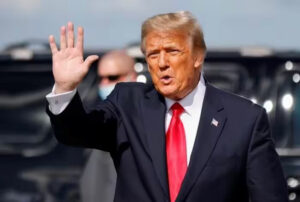By Justine Irish D. Tabile, Reporter
WORLD TRADE ORGANIZATION (WTO) Director General Ngozi Okonjo-Iweala has called on all sides to “chill” and not retaliate should the US follow through on its threat to impose tariffs on most imports, citing the potential economic fallout.
Speaking at a town hall session at the World Economic Forum in Davos, Thursday, Ms. Okonjo-Iweala said that a similar event in the 1930s, which deepend the Great Depression.
“Even if a tariff is levied, please keep calm. Don’t wake up and, without laying the necessary groundwork, levy your own. If there’s a 25% tariff, I’ll do 40 and so on. That’s why I’m very intent (that the threat of a trade wardoes not become) a self-fulfilling prophecy,” she said.
“We have done the numbers. We have tit-for-tat retaliation, whether it’s 25% or 60% tariffs, and if we go to where we were in the 1930s, we are going to see double-digit global gross domestic product (GDP) losses,” she added.
She said 80% of the world trade today is performed under WTO terms.
She added that world trade is at a peak of $30.4 trillion, which is higher than the pre-pandemic peak.
“So there’s resilience. Does that mean I’m not concerned? No, I’m not trying to say that, but I just sense a lot of hyperventilation, and we need to take a deep breath,” she said.
However, she added that even in the absence of tit-for-tat retaliation, under a scenario of two trading blocs that minimize trading with each other, major setbacks to GDP are also in store.
“We have done that work too; we are going to lose 6.4% of real global GDP in the longer term. That is like losing the economies of Japan and South Korea combined, $6.75 trillion; that is far from trivial, and that will hurt everyone also,” she said.
She expressed the hope that countries use the WTO process to settle disputes. Member countries are entitled to launch a series of investigations if they think they are being harmed and request consultation from the economy that is harming them.
Meanwhile, Ambassador of Brazil to the WTO Guilherme de Aguiar Patriota said that using tariffs politically may hurt the international rules-based system.
In particular, he said that the tariffs may imply that the commitments that everyone has made at the WTO after so many years of its existence, which everybody abides by, are suddenly “no longer important or relevant from a legal or commitment standpoint.”
“I think that’s a bad message. It kind of ruins the chessboard a little bit and leaves countries wondering what is valid, what are the rules, and what is the common reference point for everyone to interact,” he said.
In the Philippines, Foundation for Economic Freedom President Calixto V. Chikiamco said that the Philippines may fare better than others due to its small trade deficit with the US.
“The Philippines in the Age of Trump 2.0 may fare better than other nations. The country’s trade deficit with the US remains relatively small at $10 billion. Compare that with Vietnam, whose trade deficit with the US has soared to more than $110 billion. Vietnam may be the target of Trump tariffs,” he said via Viber.
“On the other hand, during Trump’s first term, his administration indicated a desire to forge a free trade agreement with the Philippines, something that former US President Biden refused to do,” he added.
Rizal Commercial Banking Corp. Chief Economist Michael L. Ricafort said that the Philippines could be indirectly affected by the import tariffs that President Donald J. Trump will impose.
“More protectionist or America-first policies by Trump could slow down economies (subject to) higher import tariffs such as those of China, Mexico, and Canada, among others,” he said via Viber.
“So the Philippines could be indirectly adversely affected by its contribution to Chinese exports to the US and other global supply chains weighed down by US import tariff hikes and resulting retaliatory action,” he added.
However, he said that foreign investors diversifying away from China and from those affected by higher US import tariffs have the option to transfer to other ASEAN or Asian countries such as the Philippines.

